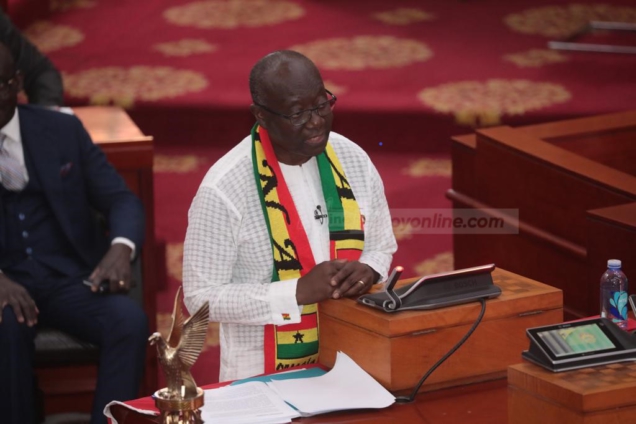Under the new proposal, the government is offering an upward adjustment of the principal by 15% right from the start. So, for example, if you hold a bond with a face value of GHS 1,000 today which matures in 2027, the new bond gives you GHS1,150 right from the start.
The government would pay an average coupon rate of 8.4% per annum and an additional 10% cash payment every year.
In 2023, the government would pay 5% out of the 8.4% coupon rate. The other 3.4% is added to the principal of GHS 1, 150 which comes to GHS 1,189.1 at the end of 2023.
In 2024, the government pays 5% on the capitalized principal of GHS 1,189.1 and the remaining 3.4% is capitalized to send the new principal to GHS 1,229.53 at the end of 2024.
In 2025, government now pays 8.4% on GHS 1,229.53. This remains the same for 2026 and 2027.
In terms of the cash flow implications, this means you will receive coupons of GHS157.5, GHS159.46, GHS203.28, GHS203. 28, and GHS203.28 in 2023, 2024, 2025, 2026 and 2027 respectively. In 2027, you will also receive a principal of GHS1,229. 53
In comparison, the old bonds at an average coupon rate of 18.5% will pay a coupon of GHS185 every year and a principal of GHS 1,000 in 2027.
If you discount these cash flows using the 18.5% prevailing on the old bonds, the present value for the future streams of cash flows under the old bonds gives you GHS 1,000 just as your face value today. This means NPV is zero. But if you discount the future cash flows under the new offer at the same 18.5%, you get a positive NPV of GHS85. This means the new bonds are offering a return of more than 18.5%. In fact, around 21% per annum.

I must mention, however, that the two rates of return (under the old and the new) are below the current inflation rate, meaning that the real return is actually negative for both. But the new one is better because it minimizes the negative returns.
If you stick to the old bonds, you earn an average of 18.5% per annum till maturity. It will not change. With the new bond, the return is slightly higher than 20% (About 21%).
I must also add that from the cash flows, it means that the government is pushing most of the payments to the next government (NPP/NDC) in 2025 and beyond. If NPP wins, they will continue with their creation and if NDC wins, they will inherit a huge cash outflow burden. But these arguments are for the politicians to make.
Latest Stories
-
Nero X announces release date for new single ‘Low Key’
7 minutes -
Credit fundamentals see positive Development – Stanbic Bank’s Karen Kwarteng
11 minutes -
DBG celebrates International Women’s Day with empowerment initiative at Design and Technology Institute
23 minutes -
2025 budget offers hope and stability – Mahama Ayariga
37 minutes -
Gov’t proposes 3 percent increase in Growth & Sustainability Levy for mining sector
39 minutes -
2025 Budget: We never collected Betting Tax – Former Finance Minister
41 minutes -
JoySports National Sports Dialogue: Anthony Baffoe announced as speaker
44 minutes -
JoySports National Sports Dialogue: Rex Danquah unveiled as speaker on infrastructure
48 minutes -
This is clearly is a budget of a gov’t that keeps its promises – Majority leader
55 minutes -
Mrs. Josephine Agyekum (nee Adjei)
1 hour -
Adisadel College Millennium Year Group unveils landmark Job 600 renovation
1 hour -
Ogum pleased with Kotoko performance against Legon Cities despite injury setbacks
1 hour -
Check out government’s ¢43.3bn allocation to various sectors of the economy
1 hour -
We’ll formalise the export of Ghanaian labour to other countries – Ato Forson
1 hour -
2025 Budget: Full Statement to Parliament delivered by Finance Minister Cassiel Ato Forson
1 hour

